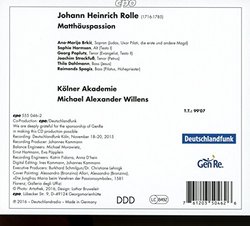| All Artists: Ana-Marija Brkic, Thilo Dahlmann, Joachim Streckfuss, Sophie Harmsen, Raimonds Spogis, George Poplutz Title: Johann Heinrich Rolle: Matth�uspassion Members Wishing: 0 Total Copies: 0 Label: CPO Release Date: 4/29/2016 Genres: Opera & Classical Vocal, Classical Styles: Oratorios, Vocal Non-Opera, Oratorios Number of Discs: 2 SwapaCD Credits: 2 UPC: 761203504626 |
Search - Ana-Marija Brkic, Thilo Dahlmann, Joachim Streckfuss :: Johann Heinrich Rolle: Matth�uspassion
 | Ana-Marija Brkic, Thilo Dahlmann, Joachim Streckfuss Johann Heinrich Rolle: Matth�uspassion Genres: Opera & Classical Vocal, Classical Recording Premiere of Rolles St. Matthew Passion Following the release of the richly colored Christmas Oratorio (7988743), many of you no doubt now have a special place in your hearts for Johann Heinrich Rolle, who was act... more » |
Larger Image |
CD Details
Synopsis
Product Description
Recording Premiere of Rolles St. Matthew Passion Following the release of the richly colored Christmas Oratorio (7988743), many of you no doubt now have a special place in your hearts for Johann Heinrich Rolle, who was active as the Director musices and Kantor at the Altstädtisches Gymnasium in Magdeburg for more than thirty years and unfortunately today continues to be little known. In his travel writings the English music historian Charles Burney described Rolle, who enjoyed great popularity during his lifetime, as a fiery composer rich in invention who had gained fame and illustrious renown with his works for the church. The obituaries penned on his death emphasized his ""outstanding compositions"" and ""early genius."" On the occasion of the three hundredth anniversary of Rolles birth, we are pleased to be able to present to you the first recording of his St. Matthew Passion of 1748. The music is set to the text of Martin Luthers translation of the Gospel of St. Matthew (from chapter 26, verse 30, to the end of chapter 27), individual chorale strophes, and free texts whose author is not named and has not yet been identified. The biblical text is set in secco recitatives, accompagnati, and ariosi (shorter segments resembling arias) with the accompaniment of strings and turba choruses, while accompagnato recitatives, arias, duets, and large framing choral numbers are intended for the free poetic texts. Rolle designs larger dramatic scenes in which one individual segment goes over into the next. Arias and chorale strophes commenting on the biblical events from the perspective of the individual Christian and the whole of Christendom and underscoring and summarizing their theological significance occur at the end of each of the scenes. Unlike Johann Sebastian Bach, for instance, who begins his passion oratorio of the same name with the last reference to Jesuss passion (Matthew 26:1-2), Rolle omits this traditional scene and that of the Last Supper, which includes the words of institution; he begins with the foreshadowing of Peters denial. On the whole, it may be said that Rolles St. Matthew Passion represents a characteristic composition from the age of sensibility. The drama of the historical events may dominate the content, but it is the consoling message of the Christian believers firm faith in salvation that occupies this composers center of interest and has its musical fixed point in the arias.
